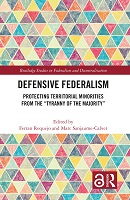Chapter 8 The Role of Constitutional Judges in Protecting Territorial Self- Government
Proposal review
| dc.contributor.author | Kössler, Karl | |
| dc.date.accessioned | 2022-12-16T11:01:27Z | |
| dc.date.available | 2022-12-16T11:01:27Z | |
| dc.date.issued | 2023 | |
| dc.identifier.uri | https://library.oapen.org/handle/20.500.12657/60268 | |
| dc.description.abstract | This chapter seeks to explore to what degree judges have used their key role regarding the distribution of powers in order to protect the territorial self-government of subnational entities in federal systems, especially if they are characterized by the presence of national minorities. This question gains particular salience from the insight that the role of courts is often ambivalent, as they may in fact contribute to both “making” federalism and “unmaking” it. The chapter starts with a clarification of key concepts and a justification of the selection of federal systems that it draws evidence from. This selection is based on two criteria: first, the existence of a constitutional court entrusted with the ultimate interpretation of the country’s constitution and, secondly, the employment of federalism as a tool to ensure the territorial self-government of one or more national minorities. The chapter then goes on to analyze from a comparative perspective to what degree judges have protected territorial self-government in four countries, namely Canada, India, Belgium and Spain. It does so with a focus on the distribution of powers and thereby covers jurisprudence on three of the most important dimensions of how responsibilities are allocated. These dimensions are exclusive subnational powers, concurrent powers and the suspension of subnational powers under provisions of emergency rule, all of which are litmus tests for the judicial protection of self-government. On this basis, the chapter’s comparative conclusions point out that judges in each of the four countries have strongly protected territorial self-government in some of the three analyzed dimensions of the distribution of powers and less so in others, thus confirming the importance of a differentiated and in-depth approach. They also discuss whether a change from the traditional role of judges as federal arbiters enforcing the constitution to a new role as active facilitators of conflict management can be useful for guaranteeing that interests of subnational entities are respected. | en_US |
| dc.language | English | en_US |
| dc.subject.classification | thema EDItEUR::J Society and Social Sciences::JP Politics and government | en_US |
| dc.title | Chapter 8 The Role of Constitutional Judges in Protecting Territorial Self- Government | en_US |
| dc.type | chapter | |
| oapen.identifier.doi | 10.4324/ 9781003296065-8 | en_US |
| oapen.relation.isPublishedBy | 7b3c7b10-5b1e-40b3-860e-c6dd5197f0bb | en_US |
| oapen.relation.isPartOfBook | 61e7969d-0164-40f4-a64c-4018e1a568ff | en_US |
| oapen.relation.isbn | 9781032281964 | en_US |
| oapen.relation.isbn | 9781032282770 | en_US |
| oapen.imprint | Routledge | en_US |
| oapen.pages | 24 | en_US |
| oapen.remark.public | Funder name: Eurac Research | |
| peerreview.anonymity | Single-anonymised | |
| peerreview.id | bc80075c-96cc-4740-a9f3-a234bc2598f1 | |
| peerreview.open.review | No | |
| peerreview.publish.responsibility | Publisher | |
| peerreview.review.stage | Pre-publication | |
| peerreview.review.type | Proposal | |
| peerreview.reviewer.type | Internal editor | |
| peerreview.reviewer.type | External peer reviewer | |
| peerreview.title | Proposal review | |
| oapen.review.comments | Taylor & Francis open access titles are reviewed as a minimum at proposal stage by at least two external peer reviewers and an internal editor (additional reviews may be sought and additional content reviewed as required). |

